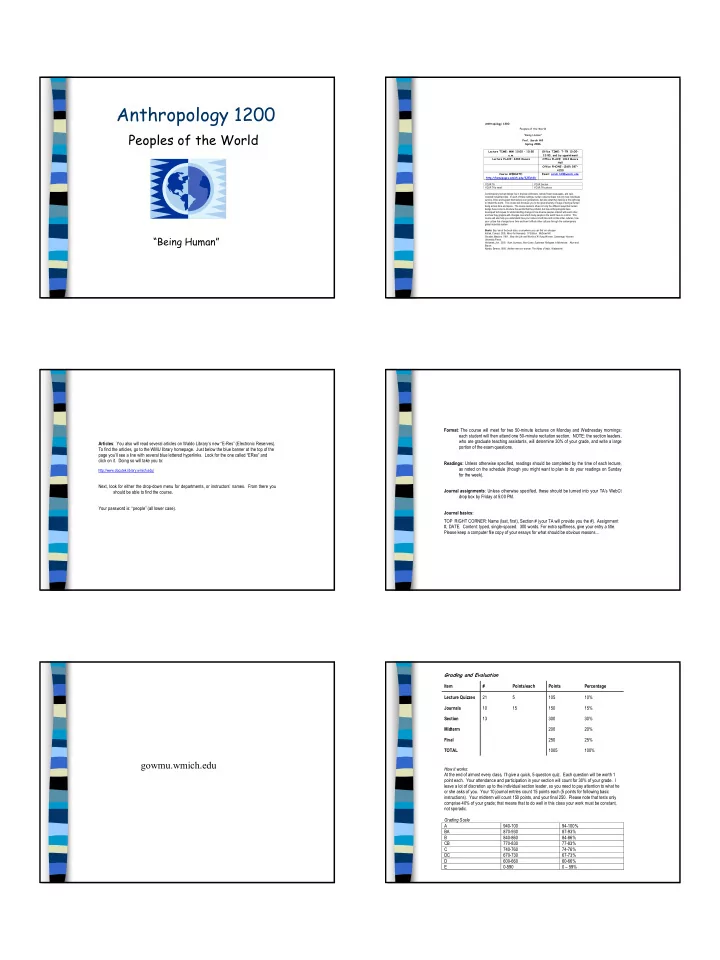

Anthropology 1200 Anthropology 1200 Peoples of the World Peoples of the World “Being Human” Prof. Sarah Hill Spring 2006 Lecture TIME: MW 10:00 – 10:50 Office TIME: T-TR 10:00- a.m. 12:00, and by appointment Lecture PLACE: 4203 Knauss Office PLACE: 1012 Moore Hall Office PHONE: (269) 387- 4150 Course WEBSITE: Email: sarah.hill@wmich.edu http://homepages.wmich.edu/%7Eshill/ YOUR TA YOUR Section YOUR TA’s email YOUR TA’s phone Contemporary human beings live in tropical rainforests, remote frozen seascapes, and vast, crowded industrial cities. In each of these settings, human cultures shape not only how individuals survive, thrive and sustain themselves over generations, but also what they believe is the right way to inhabit the world. This course will introduce you to the great diversity of ways of being a human being across time and space. The course seeks to show not only the different ways that human beings have come to structure the worlds that they inhabit, but how anthropologists have developed techniques for understanding change in how diverse peoples interact with each other, and how they grapple with changes over which many people in the world have no control. This course will also help you understand how your culture is both like and not like other cultures, how your culture has changed over time and how it effects other cultures through the contemporary global industrial system. Books : Buy ‘em at the book store, or anywhere you can find ‘em cheaper. Kottak, Conrad. 2005. Mirror for Humanity . 5 th Edition. McGraw Hill. “Being Human” Shostak, Marjorie. 1981. Nisa: the Life and Words of A! Kung Woman . Cambridge: Harvard University Press. Holtzman, Jon. 2000. Nuer Journeys, Nuer Lives: Sudanese Refugees in Minnesota . Allyn and Bacon. Nanda, Serena, 1999. Neither man nor woman: The Hijras of India . Wadsworth Format : The course will meet for two 50-minute lectures on Monday and Wednesday mornings; each student will then attend one 50-minute recitation section. NOTE: the section leaders, who are graduate teaching assistants, will determine 30% of your grade, and write a large Articles : You also will read several articles on Waldo Library’s new “E-Res” (Electronic Reserves). portion of the exam questions. To find the articles, go to the WMU library homepage. Just below the blue banner at the top of the page you’ll see a line with several blue lettered hyperlinks. Look for the one called “ERes” and click on it. Doing so will take you to: Readings: Unless otherwise specified, readings should be completed by the time of each lecture, as noted on the schedule (though you might want to plan to do your readings on Sunday http://www.docutek.library.wmich.edu/ for the week). Next, look for either the drop-down menu for departments, or instructors’ names. From there you Journal assignments : Unless otherwise specified, these should be turned into your TA’s WebCt should be able to find the course. drop box by Friday at 5:00 PM. Your password is: “people” (all lower case). Journal basics: TOP RIGHT CORNER: Name (last, first), Section # (your TA will provide you the #). Assignment #, DATE. Content: typed, single-spaced. 300 words. For extra spiffiness, give your entry a title. Please keep a computer file copy of your essays for what should be obvious reasons… Grading and Evaluation Item # Points/each Points Percentage Lecture Quizzes 21 5 105 10% Journals 10 15 150 15% Section 13 300 30% Midterm 200 20% Final 250 25% TOTAL 1005 100% gowmu.wmich.edu How it works : At the end of almost every class, I’ll give a quick, 5-question quiz. Each question will be worth 1 point each. Your attendance and participation in your section will count for 30% of your grade. I leave a lot of discretion up to the individual section leader, so you need to pay attention to what he or she asks of you. Your 10 journal entries count 15 points each (5 points for following basic instructions). Your midterm will count 150 points, and your final 250. Please note that tests only comprise 40% of your grade; that means that to do well in this class your work must be constant, not sporadic. Grading Scale A 940-100 94-100% BA 870-930 87-93% B 840-860 84-86% CB 770-830 77-83% C 740-760 74-76% DC 670-730 67-73% D 600-660 60-66% E 0-590 0 – 59% 1
LOOK CAREFULLY at Schedule! http://homepages.wmich.edu/~ shill/ Quiz Rules 1/5/03 Sarah Hill • DATE: TOP LEFT Quiz 1 Tak, A • QUIZ # TOP LEFT 1. Answer • NAME: (First-Last) TOP RIGHT 2. Answer 3. Answer • TA TOP RIGHT 4. Answer • SECTION(A,B,C,D) TOP RIGHT 5. Answer What Anthropology is: Four Fields � Primates with Culture � Material: Archaeology – Material culture � Language: Linguistics – Language � Rituals, Ideas, (and the above): Cultural – Rituals/practices � Biology – Ideas – Biology 2
Major Points Specific Points � “Natural” is Cultural � We unintentionally effect the world around us (Environment, others) � Culture is never static; always changing � Individual is NOT natural; rooted in � Culture is usually produced Western, Democratic tradition. Works UNINTENTIONALLY (at least for large well with Capitalism societies) � No one BEST way for all humans to live Diversity of US How to get an A It’s simple… University is a JOB Economies of Scale (Fordism) � Sick leave? � Late pay? 3
What we have in common; how we differ coke 4
Quiz 1 Quiz 1 • T/F: Natural is really Natural? • T/F: Democracy is best for all people. • T/F: All societies believe in the individual • T/F: To get an A, I can miss lots of class. • T/F: I do not need to show up to section to get an A. 5
Recommend
More recommend